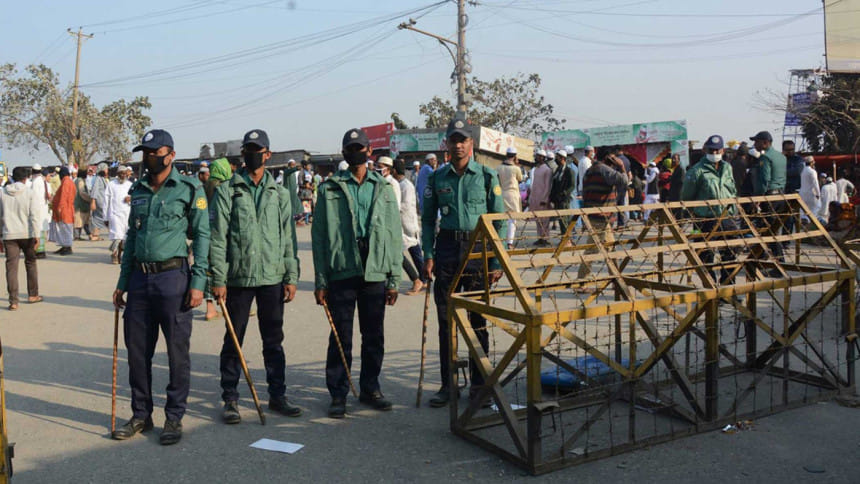It’s time to look into the well-being of the policemen

More often than not, the word "police" in our parlance gets adverse attention—and for understandable reasons. For policing, an admittedly thankless occupation in the subcontinent, at least, the bouquets are few while the brickbats are aplenty. Most police personnel have reconciled with the reality—perhaps grudgingly—that the sweet taste of appreciation is indeed rarer than the bitterness of the complaint. It is not uncommon to see our police personnel be constantly vulnerable to criticism for the manner in which they choose to exercise their discretion. Police are subject to both ridicule for not exercising discretion, and condemnation for making discretionary judgement—they are damned either way.
In such an environment, the recognition of the stress that police members have to endure, by the cerebral media—for instance, a report published in this daily on October 26—as well as the psychosocial impact of such stress should be welcome news. This is because there is hardly anyone who will take up their cause. Some may sympathise with them, but the sad reality is that publicly espousing a policeman's cause would be something that no activist could take on—even for a friend. In my experience, some policemen, while confronting a law and order situation, have often wondered that if self-expression in this country means destroying public property and causing physical injuries to others, then who are they to step in? Law enforcers, in such a scenario, feel a deep sense of shame and can hardly be assuaged by the self-justification of a stressful profession.
We need to understand the reasons behind public apathy towards police. This deficit may have stemmed from the inherent inability of the policemen to project themselves as who they are, and the dominant public perception is that our policemen have little intelligence and even less resources. As a result, there is little public appreciation for the kind of pressure our police force faces now. With conspicuous consumption, fanaticism and militancy emerging as new threats, the pressure on the law enforcement authorities has increased multifold.
An average policeman, particularly in a metropolis, has a range of duties: attending courts, mitigating marital strife, controlling mobs, chasing criminals, conducting rescue operations, providing VIP security, and tracking down absconding people, to name a few. An average working day for a policeman stretches between 12 and 16 hours, leaving little time for family, friends or recreation. An emerging exhibitionist culture, fuelled by the desire for the quick buck from the nouveau riche, has further complicated the status syndrome.
Many policemen are of the opinion that the public expect them to be fully devoted to work, and that the public has the right to set high standards—though the reality of life around us does not justify such expectations. The question that remains unasked is whether the public needs to meet the police halfway in expressing appreciation when deserved. Since that is not the case, and as the police fail to meet public expectations, the public takes the law into its own hands and wreaks its vengeance on uniformed heads as well as public properties with deplorable callousness. The stress in such a situation is not something to be brushed aside.
A policeman, having faced the fire of public discontent, has to pass the litmus test every time. For him, it is not sufficient to face the enemy—he has to additionally justify his actions in retrospect. For every adverse action, a policeman becomes accountable to his direct bosses, the government, the media, pressure groups, and several levels of the judiciary. It is doubtful whether any other public servant has to face such a degree of public scrutiny and officialdom. Working under divergent sources of stress and strain has a telling effect on the police personnel. The overstretched members often commit fatal mistakes.
There is no denying the fact that the police are under an uncomfortable proportion of stress. According to media reports, some stressed policemen have committed suicide. Therefore, the recognition, diagnosis, and management of the work stress suffered by the police officials must not see any further delay. There is a practical need to prepare training modules for stress counselling for police personnel. It would be logical to study and deal with the phenomenon of police stress systematically. There is a lack of empirical research regarding the level of work stress in the police force in Bangladesh. Additionally, there hasn't been much interest in directly examining their own somatic status and chronic job stressors by the policemen themselves. In order to increase organisational effectiveness, emphasis must be placed on the psychological and physical well-being of the police personnel.
It is time to examine the responses of the police members on job stress factors and physical symptoms, and identify the warning signs of distress among them. Such examination is expected to enable the distressed personnel to understand, accept and analyse the probable causes of bodily symptoms or illnesses in their stressful occupation. Quite clearly, there is a need to seek effective coping strategies. For police personnel, coming to terms with reality should ease the stress of having to keep a hard exterior at all times. In fact, there is a pressing requirement to realise the universal and pervasive impact of stress as an occupational hazard, and as such, our policemen could be motivated to acknowledge their own problems and seek assistance when needed.
There is a case for earnest examination of HR management to tackle the stress issue, and thus ensure a desirable image of the police. Failure to act carries the risk of propelling the mothers to continue to conjure the image of an ogre policeman every time their restless babies fail to sleep to the soothing lullabies.
Muhammad Nurul Huda is a former IGP of Bangladesh Police.

 For all latest news, follow The Daily Star's Google News channel.
For all latest news, follow The Daily Star's Google News channel. 



Comments